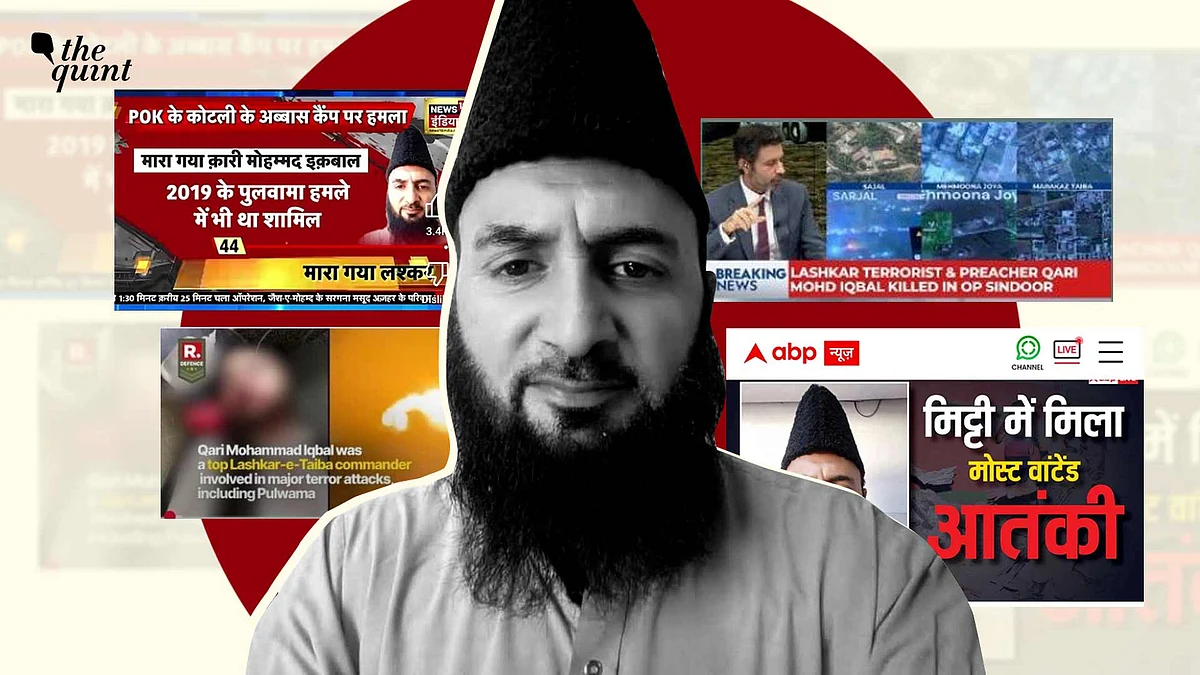
When Media Becomes the Mob: Why the Poonch Court Order Must Be Upheld
When the state doesn't neutralise lies and apologies come only after massive public outcry, state becomes complicit.

advertisement
In the midst of Operation Sindoor on 7 May 2025, Qari Mohammad Iqbal, a madrasa teacher, died saving children from cross-border shelling in Poonch.
Maulana Syeed Ahmed Habib, vice principal of the madrasa where nearly 1,200 children from across the state study, told the media that the night Iqbal died, he was trying to rush the children to the basement to protect them from the shelling. The same shell that killed Iqbal also injured three children, who are now recovering.
Yes, Iqbal was a religious teacher at a local seminary. Yes, he died in Pakistani shelling. But without any compunction or verification, news channels claimed he masterminded Pulwama and ran terror camps in PoK. They didn’t wait for police reports.
They didn’t even contact their own ground reporters, many of whom pleaded with their Delhi newsrooms to pull back the falsehoods. Instead, they went ahead with blaring headlines and bloodied images. CNN-News18, Zee News, ABP, and Republic TV amplified a fiction with the power of their bully pulpits. The police later issued a clarification, saying that Iqbal had no terror links. He lived, and died, as an Indian civilian. Following that, some channels quietly pulled videos. One offered a shallow apology, calling it a “human error.” But it was no such thing. It was a pattern. A narrative. Only the names change, the script remains the same.
The Order is the Bare Minimum
Thankfully, a local lawyer took the matter to court. On 28 June, a Special Mobile Magistrate in Poonch directed the police to register an FIR against Zee News and News18 for branding the deceased, Qari Mohammad Iqbal, as a Pakistani terrorist.
The court found prima facie violations of defamation, public mischief, and religious hate-mongering under the Bharatiya Nyaya Sanhita (Sections 353, 356, and 196(1) and Section 66 of the IT Act.
But the Poonch magistrate’s order does not convict anyone. It simply directs that an FIR be registered. This is not judicial activism. It is statutory compliance. Under Section 175 of the Bharatiya Nagarik Suraksha Sanhita (BNSS), once a cognisable offence is disclosed, registration of FIR is mandatory.The Supreme Court, in Lalita Kumari vs State of UP, 2014, made this crystal clear. The court rightly rejected arguments about press freedom and jurisdiction. It proceeded on the principle that defamation is actionable where harm is suffered, not where the lie was born. The court upheld not just legality, it upheld dignity. And in doing so, it took a modest but essential step toward constitutional justice.
Hate Speech as Constitutional Tort
In Kaushal Kishore vs State of UP (2023), the Supreme Court’s Constitution bench addressed a critical question: can a statement by a public functionary that violates the fundamental rights of citizens amount to a constitutional tort?
In this case, the lie about Iqbal was not just an insult. It became actionable the moment state authorities allowed it to stand uncorrected.
When lies are not neutralised by the state—and when apologies come only after massive public outcry—the state becomes complicit. The Constitution Bench had reiterated: “The right to life includes the right to dignity. It must be protected from both State and non-State actors."
Appellate Courts Must Stay Away
The Constitution’s Preamble commits India to fraternity—assuring dignity to every individual. But dignity cannot survive in a society where media channels manufacture terror narratives about civilians based on religion, appearance, or profession.
As Justice Chandrachud wrote in Puttaswamy vs Union of India (2017): “Dignity is not a gift of the State. It is a foundational right.”
The Constitution Bench in Kaushal Kishore warned that where the State fails to prevent such harm, it fails its constitutional duty under Article 21.
The Supreme Court, and high courts, must resist any temptation to interfere at this stage. An FIR is not a conviction. It is not even a charge. It is merely a trigger for investigation. To preempt that—to shield powerful media houses from even the glare of police inquiry—would be judicial coddling of the very impunity the Constitution seeks to dismantle.
Moreover, if the Supreme Court has repeatedly upheld the criminalisation of hate speech, public mischief, and defamation when it comes from political leaders (Subramanian Swamy v. Union of India, 2016), why should news anchors be given immunity? If anything, they carry more responsibility. Their voices travel farther. Their lies are dressed as truth.
The Lie Must Be Prosecuted
This case is not just about Qari Mohammad Iqbal. It is about the next Iqbal, and the next. It is about whether the Constitution can protect citizens not just from the state, but from the unholy alliance of misinformation, prejudice, and power.
To interfere would be to say: your reputation is collateral damage. Your faith makes you suspect. And your death is content. Let that not be the legacy of this Republic.
(Sanjay Hegde is a senior advocate at the Supreme Court of India. This is an opinion piece and the views expressed are the author’s own. The Quint neither endorses nor is responsible for them.)
- Access to all paywalled content on site
- Ad-free experience across The Quint
- Early previews of our Special Projects
Published: undefined